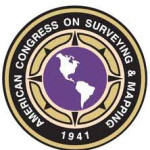- Industry: Earth science
- Number of terms: 93452
- Number of blossaries: 0
- Company Profile:
Founded in 1941, the American Congress on Surveying and Mapping (ACSM) is an international association representing the interests of professionals in surveying, mapping and communicating spatial data relating to the Earth's surface. Today, ACSM's members include more than 7,000 surveyors, ...
An approximation to mean lower low water adopted as a tidal datum for a limited region and retained for an indefinite period. It is used primarily for civil engineering in rivers and harbors. Columbia River lower low water datum is an example.
Industry:Earth science
A tidal current which flows continually, with the direction of flow changing through all points of the compass during the tidal period.
Industry:Earth science
Any coordinate system in which at least one of the geometric elements (lines or surfaces) used for reference is curved. Coordinates are determined by the intersections of curved lines or surfaces rather than by intersections of straight lines or planes only. In geodesy, the most important curvilinear coordinate systems are the astronomic, ellipsoidal, geocentric, geodetic, spherical and spheroidal.
Industry:Earth science
A room or alcove devoted to the development of pictures from exposed photographic film and therefore kept dark (or, at least, free from radiation at those wavelengths to which the film is sensitive).
Industry:Earth science
The quantity ln ((tan¼(π 2φ))((1 + e sinφ)/ (1 - e sinφ))e/2) in which φ is the geodetic latitude and e is the eccentricity of the rotational ellipsoid. This quantity is also called the isometric latitude.
Industry:Earth science
A coordinate system defined by families of curves or surfaces intersecting at right angles. Although this kind of coordinate system is also referred to, sometimes, as a rectangular coordinate system, the latter term is more usually applied to coordinate systems composed of straight lines or planes.
Industry:Earth science
The process of making contact prints by placing the original and a sensitized sheet in contact.
Industry:Earth science
A star catalog giving the approximate coordinates of 613 954 stars between declinations 21<sup>o</sup> and 90<sup>o</sup> and brighter than 10. 0m. Usually referred to as the C. D. It complements the Bonne Durchmusterung, which gives approximate coordinates for stars from +90<sup>o</sup> to 23<sup>o</sup> declination.
Industry:Earth science
(1) A survey network connected to and contained in a survey network of the same or less accuracy. (2) A survey network connected to and contained in a survey network of the same or less accuracy, and with shorter distances between stations. (3) A survey network connected to and contained in a survey network of the same or greater accuracy, and with shorter distances between stations. A densification network is established to provide control which is more accessible than and at least as accurate as that of the containing network. Distances between stations in the densification network are usually much shorter than distances between stations in the network containing it.
Industry:Earth science
A method of hill shading by drawing, on a transparent sheet of plastic which has been coated lithographically with a gray tone, sloping regions by darkening or lightening those regions using black or white pencils.
Industry:Earth science
